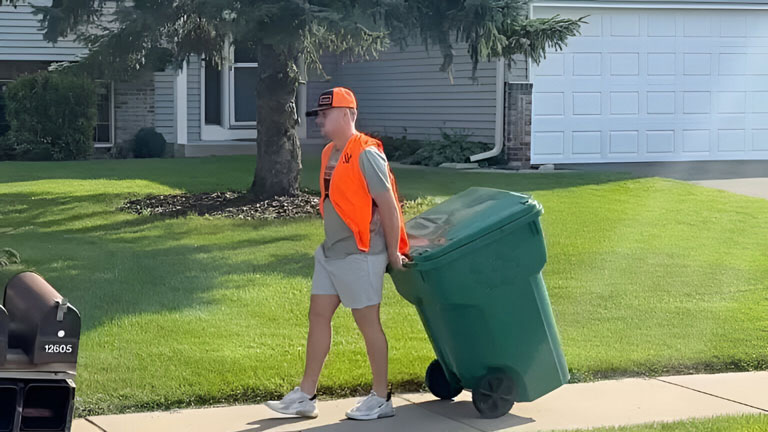
Today, both domestic and industrial waste are growing rapidly. The world produces over 2 billion tons of municipal solid waste annually, with recent figures suggesting generation could reach 2.1 billion tons by 2023. But only 19% of this is recycled. It is time to manage our waste in an environmentally friendly manner, especially in a growing population and increasing consumption. In this article, we will explore how to dispose of your home or office waste in a way that minimizes environmental damage and maximizes resource reuse.
The Three R Principles (Reduce, Reuse, Recycle)
The foundation of any sustainable waste disposal is based on the Three R Principles—Reduce, Reuse, and Recycle. For example, whenever possible, buy fewer items and choose sustainable materials. Before throwing away old items, check if they can be repurposed. According to the HECS Environment, adopting these three R principles in homes can significantly reduce waste. For example, if you have old clothes or shoes at home, reusing or donating them is better than throwing them away. Similarly, reusing plastic bottles or recycling paper can be helpful. These small steps can not only save on household expenses but also contribute to protecting the environment.
Recycling
Record-generated waste can be recycled and transformed into new things. First, separate your waste into different categories: dry waste includes paper, plastic, glass, and metal items, while wet waste includes organic waste (such as food, fruits, and flowers). Don’t throw these together; keep them separate. Some key steps are:
- Fold paper and cardboard properly and keep them separate so they can be properly used at recycling centers.
- Wash and clean plastic and glass bottles before putting them in the recycling bin to prevent contamination and make them recyclable.
- Clean metal cans (such as tin and aluminum) and return them to collection points.
These simple steps increase recycling efficiency. Keep in mind that only 19% of the world’s waste is recycled, but if we separate waste properly, we can play a significant role. For example, sending old newspapers and magazines lying around your home for recycling will prevent trees from being cut down to produce new paper.
Donation and Reuse
Many items in your junk can be used by others in need. Donating is an effective way. For example, your old working mobile phone, computer, or laptop can be useful somewhere. RecycleKaro reports that donating working electronic devices extends their lifecycle and reduces e-waste. Similarly, old clothes, shoes, bags, etc. can be donated to social welfare organizations. This reuses these items and reduces the amount that ends up in the trash. You can also donate them to local NGOs or relief organizations. These items can often be donated through corporations and online platforms. This will not only reduce waste in your home but also help many people in society.
Composting
Biodegradable waste from your home or garden—such as vegetable peels, fruit peels, tea leaves, flower petals, etc. It can be converted into fertilizer (manure) through composting. This is nature’s own recycling process. To start composting, combine green and brown materials in a small bin or container. Green materials can include kitchen scraps and tea leaves, and brown materials can include dried leaves or paper. Regularly dry-wet these materials and shake the bin periodically to aerate them. Be careful not to add meat, dairy, or oily items to the compost, as they can cause odors and pests. Compost created with these simple steps nourishes your garden soil. It is also very beneficial for the environment: composting improves soil fertility and significantly reduces methane emissions from trash. In this way, even ordinary kitchen waste can turn into valuable compost over time.
E-Waste Management
The number of electronic products in homes has increased these days, leading to a growing generation of e-waste. Old computers, mobile phones, TVs, tablets, fans, and radios contain toxic chemicals (such as lead and mercury). Therefore, they should be disposed of with special care. The first recommendation is to donate working electronic devices or have them repaired by a repair/upgrade service and then reuse them. When they are no longer functional, please don’t throw them in the trash. Instead, contact your nearest certified e-waste collection center or recycling agency. RecycleKaro’s guide states that only certified professionals can safely process your e-waste.
You can find the nearest e-waste collection center in your city or by using an online government portal. For example, many major cities organize special drives where you can deposit old batteries, CFL bulbs, laptops, and mobile phones. All these efforts ensure that your old electronics are recycled in the right place and prevent the release of toxic substances into the environment. If needed, explore available services through your local junkyard to locate certified drop-off points.
Chemical and Other Special Waste
Some household items, such as old paintbrushes (paint pots), insecticide sprays, old batteries, and CFL bulbs, are classified as hazardous waste. Their inclusion in general garbage bins poses a significant threat to the environment. Therefore, they should be kept separate. According to central regulations, household waste must be classified as wet, dry, and household hazardous.
Many municipalities are now setting up waste collection centers every 20 km where you can deposit these hazardous items. For example, you may also find containers for these items at shops selling luxury insulators or paint shops in your area. Note that today, there are only 45 standard hazardous waste disposal facilities in India, so it is best to use these items in minimal quantities whenever possible and only hand them over to certified organizations. For example, used CFL bulbs can be dropped off for free at small power stations, general stores, or municipal centers.
What You Can Do
Even small efforts can make a big difference. When generating waste at home, think first: Is this item necessary? Can it be disposed of in smaller quantities? If an old item is no longer useful to you, consider donating or selling it. Always consider reusing or recycling before throwing it in the trash. Whenever possible, participate in local awareness campaigns or cleanliness activities, such as annual clean-up drives or e-waste drives. Encourage those around you to segregate their waste and follow environmentally friendly practices. Remember, these small steps will not only keep your home environment clean but also set a positive example for others. So, adopt these reliable and eco-friendly waste disposal methods today so we can all work together to create a cleaner and safer future.


